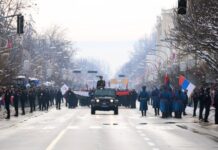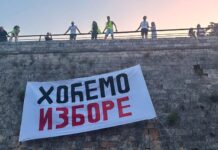“I came to be with you, to prevent anything distasteful from happening,” said the late Serbian Patriarch Pavle ahead of the massive student protests in 1997 against the destructive regime of Slobodan Milošević. Fast forward to 2025, and his successor — patriarch (lowercase intentional) Porfirije — panders to Russian intelligence services, claiming that Serbia’s cities have recently been gripped by a “color revolution,” allegedly orchestrated by Western agencies.
How did we get here? How did the highest religious office — one historically predating the presidency by centuries — fall into the hands of someone who acts more like a PR agent for the ruling political elite than a true shepherd of his people?
I’ve never been particularly religious, but I was raised to believe that “a brother is dear, regardless of his faith” — not just as a slogan, but as a way of life. Still, I believe that the church, to which most citizens of this country we call Serbia belong, should naturally stand with its people, its youth, and its academic community — not with criminals, convicts, and, of course, the “ćacis” (a phenomenon I’ll discuss in another piece).
I’m appalled, offended — though sadly not surprised — by the stance our religious leader has taken against his own people. If he truly wished, as he claims, to stay out of politics (a claim nobody seriously believes), why hasn’t he at least spoken out in defense of the young people who for months have endured beatings, insults, threats, and all manner of abuse at the hands of political henchmen?
Perhaps none of this would feel so devastating — after all, Russia, often mistakenly called the cradle of Orthodoxy, leans naturally toward the right (where religious conservatism frequently thrives). But then a new twist: Dragan Šutanovac — once the head of Serbia’s main opposition party, now a loudmouth for the ruling SNS, and Serbia’s newly appointed ambassador to Washington — declared that all these protests are actually orchestrated by Russian intelligence!
And you’re left asking yourself: which intelligence service? Who are these “paid mercenaries” among Serbian students? What sort of “parallel universe,” to borrow the patriarch’s own phrase, are we living in?
Meanwhile, back in this one universe that I know and inhabit, life in my country has, at least on the surface, ground to a halt over the past few months. Ambition, hope, and the thirst for change have reached a historic boiling point. We’re living through a moment that will define a generation — young people and the broader citizenry alike. We’re witnessing scenes that, in a society deeply scarred by trauma, once seemed unthinkable — yet should have been considered entirely normal.
Scenes from Novi Pazar, Kraljevo, and many other towns reveal just how awake, compassionate, and inclusive the new generation truly is (excluding, of course, the aforementioned “ćacis”). It turns out it didn’t take much to suppress the hatred that political and religious leaders have tried to sow for decades. When people carry genuine Christian (or Islamic) values in their hearts — like the biblical lesson, “Let him who is without sin cast the first stone” — it becomes clear that we could live in a far more beautiful and dignified society.
Still, while the current patriarch — mockingly nicknamed “Profitije” by some — can claim no credit for this awakening, I can’t help but feel proud of Serbia’s youth, particularly from its diverse (and too often underestimated) ethnic communities who call this country home.
Let’s not forget: Serbia — especially Vojvodina, with its six official languages — boasts the greatest ethnic diversity in the region. That’s why these narratives matter. They transcend borders.
I hope this isn’t just a fleeting trend, but a glimpse of a future as bright as the images currently being shared around the world.
As for Porfirije himself, I would simply pose the same question once asked by Patriarch Pavle:
“What would it be like if you hadn’t sworn an oath of eternal humility?”
Because after all — “The earthly kingdom is fleeting, but the heavenly one is eternal!”
Author: Darko Mandić













